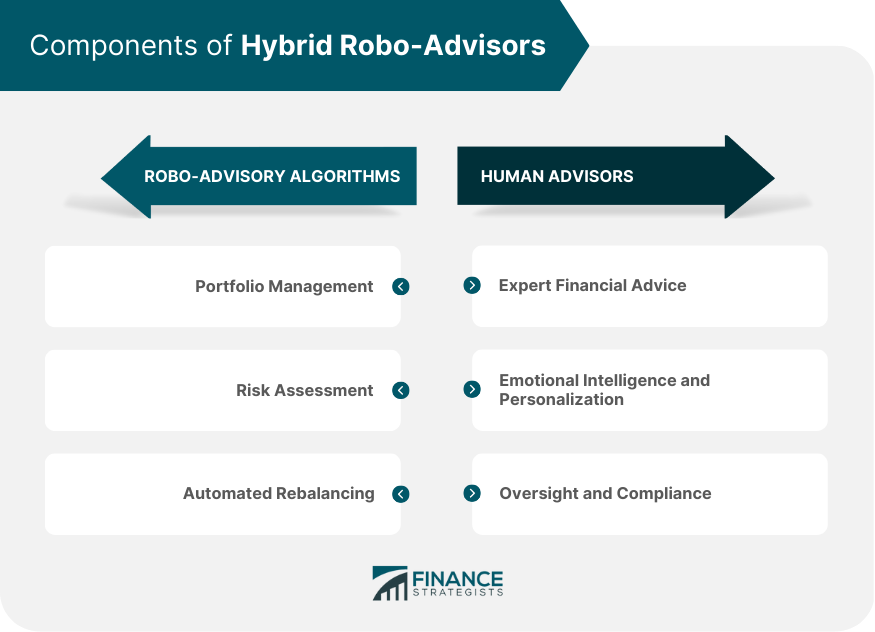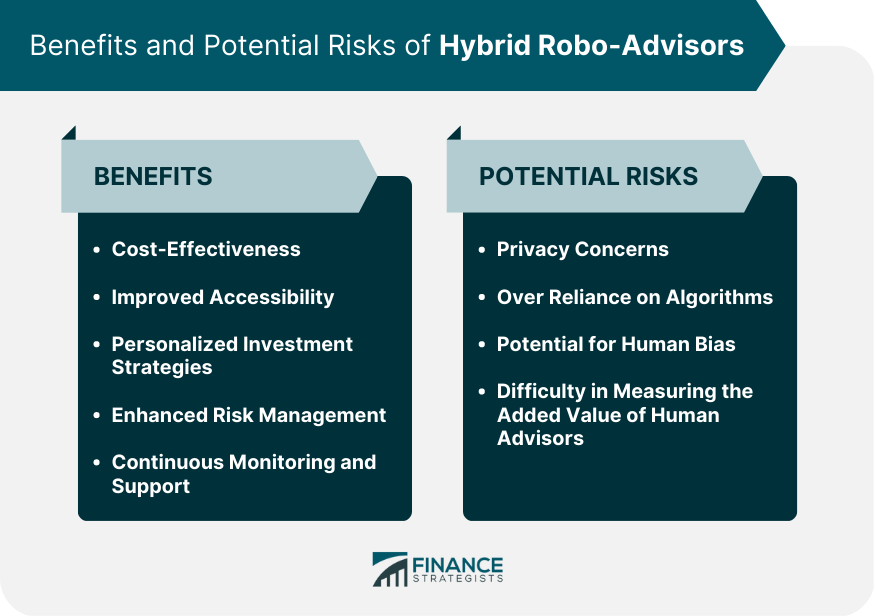Hybrid robo-advisors is an investment platform that combines the benefits of both automated investment management and human financial advice. These platforms use technology to manage portfolios based on investors' goals, risk tolerance, and investment preferences, while also offering access to human financial advisors for more personalized guidance and support. 1. Portfolio Management: Hybrid robo-advisors utilize advanced algorithms to create and manage diversified investment portfolios based on an individual's risk tolerance, financial goals, and investment horizon. 2. Risk Assessment: These algorithms also analyze market trends and historical data to identify potential risks and recommend suitable investment strategies. 3. Automated Rebalancing: Hybrid robo-advisors can automatically rebalance portfolios to maintain optimal asset allocation and reduce risk over time. 1. Expert Financial Advice: The human component of hybrid robo-advisors provides personalized financial advice tailored to the unique needs of each investor. 2. Emotional Intelligence and Personalization: Human advisors bring emotional intelligence and empathy to the client relationship, creating a more personalized experience. 3. Oversight and Compliance: Human advisors ensure that the robo-advisor algorithms comply with financial regulations and industry best practices. Established Financial Institutions: Many traditional banks and financial institutions have entered the hybrid robo-advisory space, leveraging their existing client base and brand reputation. Fintech Startups: Innovative fintech startups have emerged as key players in the hybrid robo-advisory market, offering unique services and features that differentiate them from established competitors. Traditional Wealth Management Firms: Some traditional wealth management firms have adapted to the changing landscape by integrating hybrid robo-advisory services into their offerings, combining technology-driven solutions with their established expertise. Regulators require that hybrid robo-advisors provide clear and transparent disclosures to clients, including information about fees, investment strategies, and potential risks. Hybrid robo-advisory firms must comply with licensing and registration requirements, ensuring that they meet the necessary qualifications and standards to provide financial advisory services. Hybrid robo-advisors are subject to data protection and privacy regulations, necessitating robust cybersecurity measures and strict adherence to rules regarding the handling of sensitive client information. By leveraging technology, hybrid robo-advisors can provide investment management services at a lower cost than traditional financial advisors, making them more accessible to a wider range of investors. Hybrid robo-advisors democratize access to financial advice, enabling investors with smaller portfolios to benefit from professional investment management services that were previously only available to high-net-worth individuals. Combining the strengths of robo-advisory algorithms and human expertise, hybrid robo-advisors can create customized investment strategies tailored to each client's unique financial situation and goals. Hybrid robo-advisors offer improved risk management capabilities through the combination of algorithmic analysis and human oversight, resulting in more balanced and resilient investment portfolios. Hybrid robo-advisors provide ongoing portfolio monitoring and support, ensuring that clients' investments are continuously optimized and adjusted according to changing market conditions. The use of algorithms and automation in hybrid robo-advisors may raise privacy concerns, as sensitive financial data is processed and analyzed by these systems. While algorithms can be efficient and accurate, an overreliance on them may lead to a lack of human touch and potential errors in investment strategies. The involvement of human advisors in the hybrid robo-advisory process may introduce bias, affecting the objectivity of the investment recommendations. Quantifying the added value of human advisors in hybrid robo-advisory services can be challenging, making it difficult to justify their costs and assess their overall effectiveness. The integration of AI technologies into hybrid robo-advisory platforms has the potential to further enhance portfolio management, risk assessment, and personalized financial advice. Expansion into New Financial Services Hybrid robo-advisors may expand into new financial services, such as insurance, retirement planning, and tax optimization, offering a more comprehensive suite of solutions to clients. As the hybrid robo-advisory model gains traction, collaborations between traditional financial advisors and robo-advisory platforms may become more common, benefiting both parties and their clients. The hybrid robo-advisory market is expected to experience increased competition and consolidation as more players enter the space and existing firms seek strategic partnerships or acquisitions. Hybrid robo-advisors combine the benefits of automated investment management and human financial advice to provide personalized financial management services to investors. They use algorithms to manage portfolios based on investors' goals, risk tolerance, and investment preferences while offering access to human financial advisors for more personalized guidance and support. Key players in the hybrid robo-advisory market include established financial institutions, fintech startups, and traditional wealth management firms. Hybrid robo-advisory firms must comply with licensing and registration requirements, ensuring that they meet the necessary qualifications and standards to provide financial advisory services. Benefits of hybrid robo-advisors include cost-effectiveness, improved accessibility, personalized investment strategies, enhanced risk management, and continuous monitoring and support. However, potential risks and limitations include privacy concerns, over-reliance on algorithms, potential for human bias, and difficulty in measuring the added value of human advisors. Future prospects and trends in the hybrid robo-advisory market include the integration of artificial intelligence, expansion into new financial services, collaboration with traditional financial advisors, and increasing competition and market consolidation.Definition of Hybrid Robo-Advisors
Components of Hybrid Robo-Advisors

Robo-Advisory Algorithms
Human Advisors
Key Players in the Hybrid Robo-Advisory Market
Regulatory Considerations
Ensuring Transparency and Disclosure
Licensing and Registration Requirements
Data Protection and Privacy Regulations
Benefits of Hybrid Robo-Advisors
Cost-Effectiveness
Improved Accessibility
Personalized Investment Strategies
Enhanced Risk Management
Continuous Monitoring and Support
Potential Risks and Limitations
Privacy Concerns
Over Reliance on Algorithms
Potential for Human Bias
Difficulty in Measuring the Added Value of Human Advisors

Future Prospects and Trends
Integration of Artificial Intelligence (AI)
Collaboration With Traditional Financial Advisors
Increasing Competition and Market Consolidation
The Bottom Line
Hybrid Robo-Advisors FAQs
A hybrid robo-advisor is a financial advisory platform that combines automated algorithms with human financial advisors. Unlike traditional robo-advisors, which rely solely on algorithms for portfolio management and investment recommendations, hybrid robo-advisors bring the benefits of both technology and human expertise for a more personalized and comprehensive investment experience.
Hybrid robo-advisors use automated algorithms to assess an investor's financial goals, risk tolerance, and investment horizon. These algorithms then create a tailored investment portfolio. Human advisors complement the technology by providing personalized guidance, addressing specific concerns, and adjusting the investment strategy to align with any changes in the investor's financial situation.
Hybrid robo-advisors offer several advantages, including cost-effectiveness, improved accessibility, personalized investment strategies, enhanced risk management, and continuous monitoring and support. By combining technology and human expertise, they cater to a wider range of investors and provide a more comprehensive financial advisory service.
While hybrid robo-advisors offer numerous benefits, there are some potential drawbacks, such as privacy concerns due to data sharing, overreliance on algorithms, the potential for human bias, and difficulty in measuring the added value of human advisors. It is essential for investors to carefully consider these limitations when choosing a hybrid robo-advisory platform.
The hybrid robo-advisory market is likely to see several developments, including the integration of artificial intelligence (AI) for advanced analytics, expansion into new financial services, collaboration with traditional financial advisors, and increasing competition and market consolidation. These trends will shape the future of hybrid robo-advisory services, offering investors more sophisticated and personalized solutions.
True Tamplin is a published author, public speaker, CEO of UpDigital, and founder of Finance Strategists.
True is a Certified Educator in Personal Finance (CEPF®), author of The Handy Financial Ratios Guide, a member of the Society for Advancing Business Editing and Writing, contributes to his financial education site, Finance Strategists, and has spoken to various financial communities such as the CFA Institute, as well as university students like his Alma mater, Biola University, where he received a bachelor of science in business and data analytics.
To learn more about True, visit his personal website or view his author profiles on Amazon, Nasdaq and Forbes.











